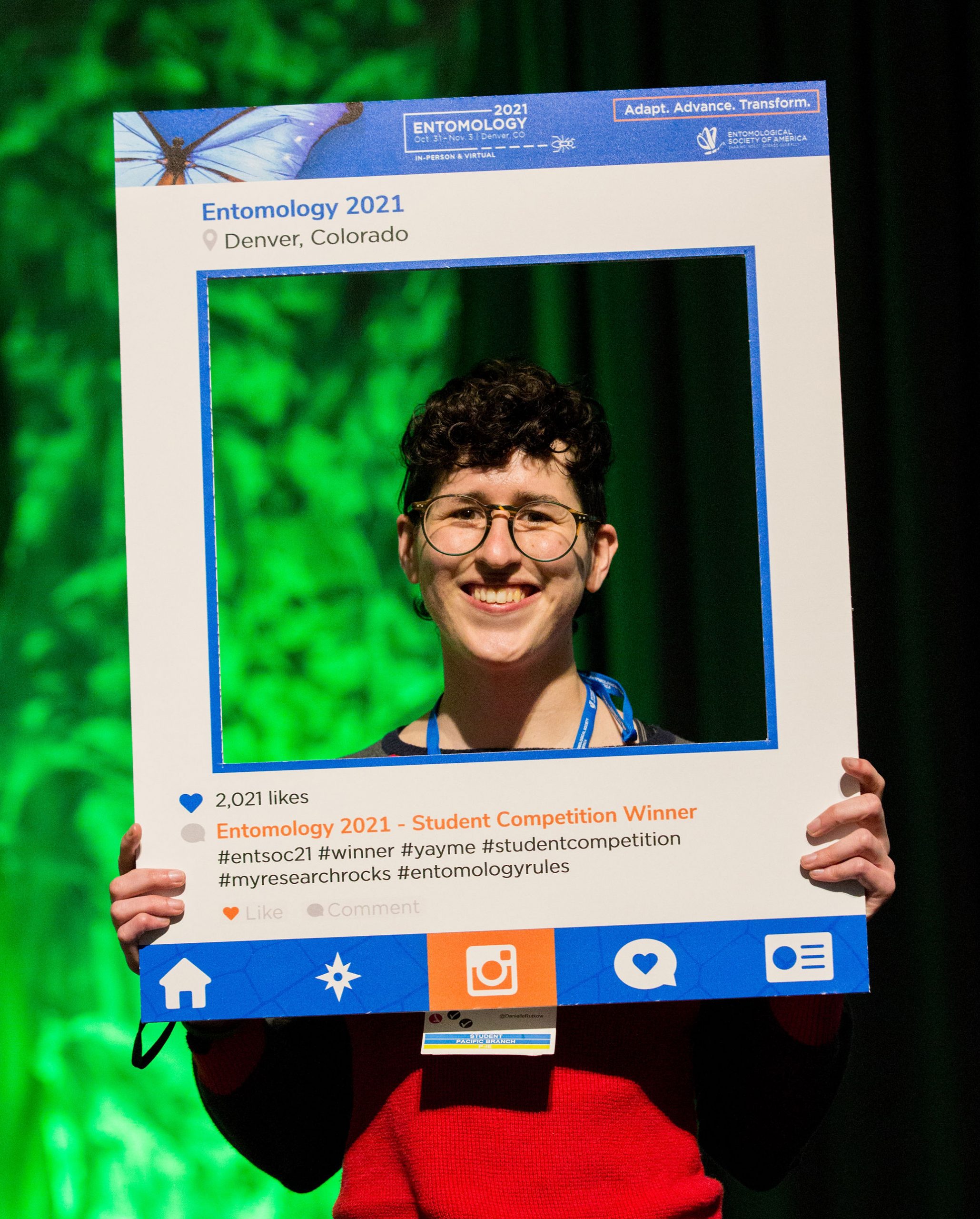
Danielle Rutkowski, UC Davis doctoral student, is framed by the award she won at the Entomological Society of America meeting. (Photo by the Entomological Society of America,
UC Davis Doctoral Candidate Wins High Honors at ESA Meeting
Doctoral student Danielle Rutkowski of the UC Davis Department of Entomology and Nematology received the President’s Prize in her category for her research presentation at the recent Entomological Society of America (ESA) meeting in Denver.Rutkowski delivered her 10-minute presentation on “Fungicide Impacts on Bumble Bees are Mediated via Effects on Bee-Associated Fungi” in the category, Plant-Insect Ecosystems: Ecology 3.” She studies with community ecologist Rachel Vannette, associate professor, and is also advised by community ecologist and professor Rick Karban.
At the ESA’s annual meetings, students are offered the opportunity to present their research and win prizes. They can compete in 10-minute papers (oral), posters, or infographics. First-place winners receive a one-year free membership in ESA, a $75 cash prize, and a certificate. Second-winners score a one-year free membership in ESA and a certificate.
Rutkowski’s abstract:
“Native bees including bumble bees are important pollinators but face threats from multiple sources, including agrochemical application. Declining bumble bee populations have been linked to fungicide application, which could directly affect the fungi often found in the stored food and GI tract of healthy bumble bees. Here, we test the hypothesis that fungicides impact bee health by disrupting bumble bee -fungi interactions.
Using two species, Bombus vosnesenskii and B. impatiens, we test the interactive effect of the fungicide propiconazole and fungal supplementation on the survival, reproduction, and microbiome composition of microcolonies (queenless colonies). We found that both bee species benefitted from fungi, but were differentially affected by fungicides.
In B. vosnesenskii, fungicide exposure decreased survival while fungal supplementation mitigated fungicide effects. For B. impatiens, fungicide application had no effect, but fungal supplementation improved survival and offspring production. Fungicides altered fungal microbiome composition in both species, and reduced fungal abundance in B. vosnesenskii microcolonies, but not in B. impatiens, where instead fungal addition actually decreased fungal abundance.
Our results highlight species-specific differences in both response to fungicides and the nature of fungal associations with bees, and caution the use of results obtained using one species to predict the responses of other species. These results suggest that fungicides can alter bee- fungi interactions with consequences for bee survival and reproduction, and suggest that exploring the mechanisms of such interactions, including interactions within bee-associated fungal communities, may offer insights into bumble bee biology and bumble bee conservation strategies. (Paper co-authors are associate professor Rachel Vannette, Eliza Litsey and Isabelle Maalouf)
Rutkowski completed her bachelor’s degree at Cornell University, where she studied how the relationship between mycorrhizal fungi and their host plants impacts insect herbivores. She currently studies “how bumble bees interact with the microbes, particularly fungi, in their environment, and how these relationships impact bee health.”
Two other UC Davis graduate students won second-place honors in their respective categories.
Maureen Page with the lab of pollinator ecologist Neal Williams, professor, UC Davis Department of Entomology and Nematology, scored second place for her presentation, “Optimizing Pollinator-friendly Plant Mixes to Simultaneously Support Wild and Managed Bees.” She competed in the category, Plant-Insect Ecosystems: Pollinators.
Kyle Lewald, with the College of Biological Sciences and the Integrated Genomics and Genetics Graduate Group, but a member of the lab of molecular geneticist and physiologist Joanna Chiu, professor and vice chair of the UC Davis Department of Entomology and Nematology, won second in his category, Systems, Evolution and Biodiversity: Genetics and Molecular Biology, with his speech on “Assembly of Highly Contiguous Diploid Genome for the Agricultural Pest, Tuta absoluta.”
ESA, founded in 1889 and headquartered in Annapolis, Md., is the world’s largest organization serving the professional and scientific needs of entomologists and others in related disciplines. Its 7000 members are in educational institutions, health agencies, private industry, and government.








